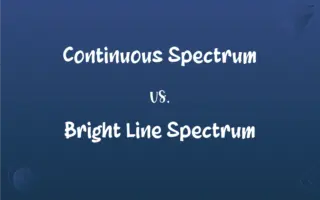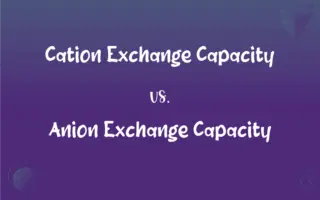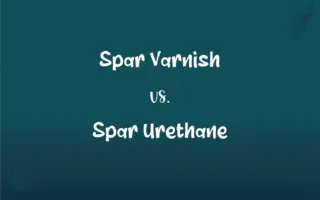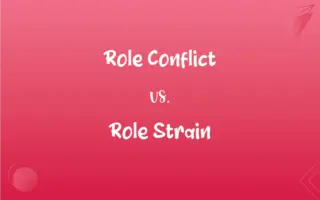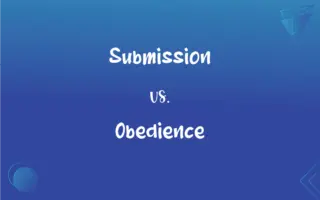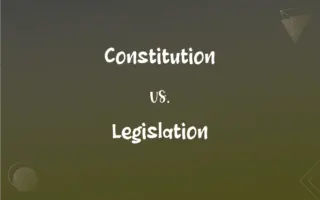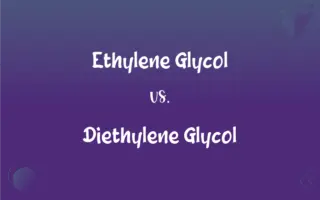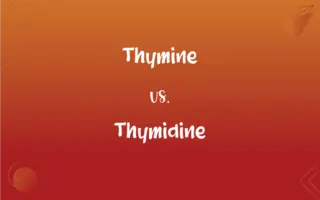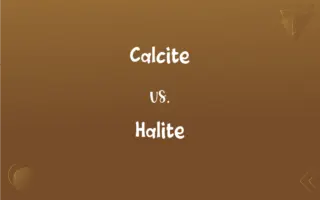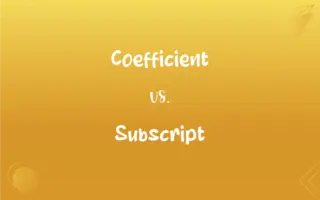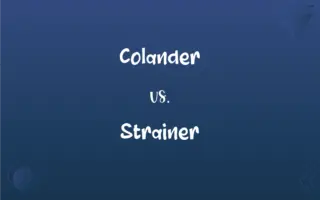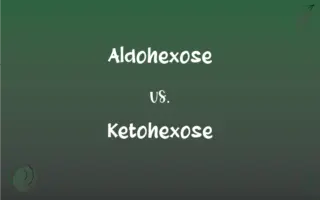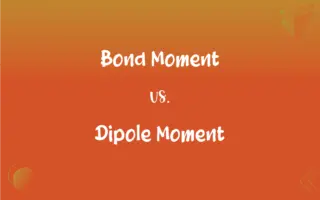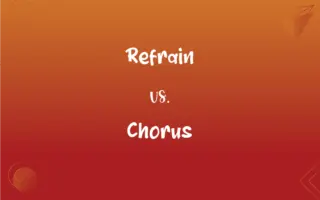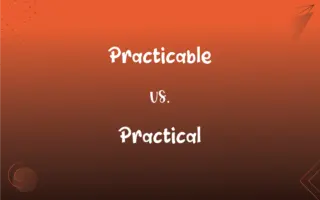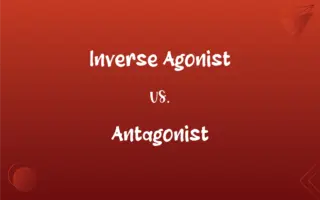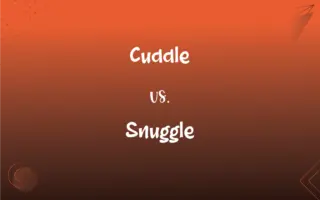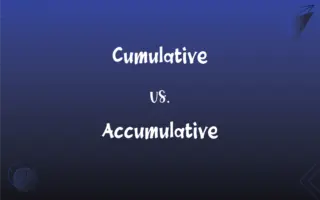Useful vs. Use: What's the Difference?
Edited by Harlon Moss || By Janet White || Updated on September 29, 2023
"Useful" refers to the ability of something to be used effectively, while "use" refers to the act of utilizing something.

Key Differences
"Useful" is an adjective describing the practical utility or applicability of an object, concept, or method, suggesting that it can serve a purpose or fulfill a need efficiently. On the other hand, "use" is a verb denoting the action of employing something for a purpose, or it can be a noun representing the manner in which something is utilized. "Useful" implies effectiveness in use, while "use" denotes the act or manner of using.
A tool, for example, is deemed "useful" if it can perform its intended function efficiently and effectively, facilitating tasks for individuals. The "use" of a tool signifies the actual application or employment of the tool in performing a task. "Useful" evaluates the tool's efficacy, while "use" articulates its application.
In the context of skills or knowledge, being "useful" indicates that such skills or knowledge can effectively address or solve problems. The "use" of skills or knowledge entails applying them in real-world scenarios or problems. Here, "useful" characterizes the value or efficacy of skills or knowledge, whereas "use" involves the practical application of these elements.
In everyday language, saying an item is "useful" provides an assessment of its practical value or benefit in certain situations. The "use" of an item, conversely, refers to how individuals employ the item to achieve specific goals or tasks. "Useful" is an evaluative term, and "use" relates to action or application.
Therefore, "useful" and "use" interact conceptually, with "useful" providing a qualitative assessment of something's utility or value, and "use" indicating the actual employment or application of that thing. The distinction rests in one being a descriptor of value or efficiency ("useful") and the other representing action or application ("use").
ADVERTISEMENT
Comparison Chart
Part of Speech
Adjective
Verb/Noun
Definition
Describes the ability of something to be used effectively.
Refers to the act or manner of utilizing something.
Context
Evaluative; assesses utility or applicability.
Action; denotes employing or applying.
Example
A "useful" tool performs its function effectively.
"Use" a tool to perform a task.
Usage
Descriptive; characterizes objects, skills, or knowledge.
Expresses action or application of objects or skills
ADVERTISEMENT
Useful and Use Definitions
Useful
Capable of being used advantageously or beneficially.
A map can be useful for navigating unfamiliar territories.
Use
To employ for a purpose; to put into service.
I use a pen to write letters.
Useful
Serving a valuable purpose or practical function.
Knowing a second language is useful in many careers.
Use
The act of utilizing something.
The use of pesticides has environmental impacts.
Useful
Contributing positively to a situation or outcome.
He provided some useful insights during the meeting.
Use
The manner of treating or handling something.
The improper use of equipment can lead to damage.
Useful
Providing convenience or ease in accomplishing a task.
A dishwasher is useful for saving time in cleaning up after meals.
Use
To put into service or employ for a purpose
I used a whisk to beat the eggs. The song uses only three chords.
Useful
Being of use or service; functioning effectively.
The guidelines were useful in creating a coherent design.
Use
To avail oneself of; practice
Use caution.
Useful
Having a beneficial use; serviceable
A useful kitchen gadget.
Use
To conduct oneself toward; treat or handle
"the peace offering of a man who once used you unkindly" (Laurence Sterne).
Useful
Being of practical use
A useful job.
Useful members of society.
Use
To seek or achieve an end by means of; exploit
Used their highly placed friends to gain access to the president.
Felt he was being used by seekers of favor.
Useful
Having a practical or beneficial use.
Use
To take or consume for a purpose
She used her savings to buy a computer.
Useful
Full of use, advantage, or profit; producing, or having power to produce, good; serviceable for any end or object; helpful toward advancing any purpose; beneficial; profitable; advantageous; as, vessels and instruments useful in a family; books useful for improvement; useful knowledge; useful arts.
To what can I useful!
Use
To partake of, especially as a habit
She rarely uses alcohol.
Useful
Being of use or service;
The girl felt motherly and useful
A useful job
A useful member of society
Use
(ys, yst) Used in the past tense followed by to in order to indicate a former state, habitual practice, or custom
Mail service used to be faster.
Useful
Of great importance or use or service;
Useful information
Valuable advice
Use
(Slang) To take an illegal or narcotic drug, especially as a habit.
Useful
Capable of being turned to use or account;
Useful applications of calculus
Use
The act of using something; the application or employment of something for a purpose
With the use of a calculator.
Skilled in the use of the bow and arrow.
Useful
Having a useful function;
Utilitarian steel tables
Use
The condition or fact of being used
A chair in regular use.
Use
The manner of using; usage
Learned the proper use of power tools.
Use
The permission, privilege, or benefit of using something
Gave us the use of their summerhouse.
Use
The power or ability to use something
Lost the use of one arm.
Use
The need or occasion to use or employ something
I have no use for these old clothes.
Use
The quality of being suitable or adaptable to an end; usefulness
I tried to be of use in the kitchen.
Use
A purpose for which something is used
A tool with several uses.
A pretty bowl, but of what use is it?.
Use
Gain or advantage; good
There's no use in discussing it. What's the use?.
Use
Accustomed or usual procedure or practice
"We are but creatures of use and custom" (Mark Twain).
Use
A particular custom or practice
Uses introduced by recent immigrants.
Use
Enjoyment of property, as by occupying or employing it.
Use
The benefit or profit of lands and tenements of which the legal title is vested in another.
Use
The arrangement establishing the equitable right to such benefits and profits.
Use
A liturgical form practiced in a particular church, ecclesiastical district, or community.
Use
The act of using.
The use of torture has been condemned by the United Nations.
Use
(uncountable) The act of consuming alcohol or narcotics.
Use
Usefulness, benefit.
What's the use of a law that nobody follows?
Use
A function; a purpose for which something may be employed.
This tool has many uses.
Use
Occasion or need to employ; necessity.
I have no further use for these textbooks.
Use
Interest for lent money; premium paid for the use of something; usury.
Use
(archaic) Continued or repeated practice; usage; habit.
Use
(obsolete) Common occurrence; ordinary experience.
Use
(Christianity) The special form of ritual adopted for use in any diocese.
The Sarum, or Canterbury, use; the Hereford use; the York use; the Roman use; etc.
Use
(forging) A slab of iron welded to the side of a forging, such as a shaft, near the end, and afterward drawn down, by hammering, so as to lengthen the forging.
Use
To utilize or employ.
Use
(transitive) To employ; to apply; to utilize.
Use this knife to slice the bread.
We can use this mathematical formula to solve the problem.
Use
To expend; to consume by employing.
I used the money they allotted me.
We should use up most of the fuel.
She used all the time allotted to complete the test.
Use
(transitive) To exploit.
You never cared about me; you just used me!
Use
(transitive) To consume (alcohol, drugs, etc), especially regularly.
He uses cocaine. I have never used drugs.
Use
(intransitive) To consume a previously specified substance, especially a drug to which one is addicted.
Richard began experimenting with cocaine last year; now he uses almost every day.
Use
To benefit from; to be able to employ or stand.
I could use a drink. My car could use a new coat of paint.
Use
To accustom; to habituate. Now common only in participial form. Uses the same pronunciation as the noun; see usage notes.
Use
To become accustomed, to accustom oneself.
Use
To suggest, request, demand or expect that other people use a specific set of gender pronouns when referring to the subject.
I use they/them pronouns.
Use
To habitually do; to be wont to do. (Now chiefly in past-tense forms; see used to.)
I used to get things done.
Use
(dated) To behave toward; to act with regard to; to treat.
To use an animal cruelly
Use
To behave, act, comport oneself.
Use
The act of employing anything, or of applying it to one's service; the state of being so employed or applied; application; employment; conversion to some purpose; as, the use of a pen in writing; his machines are in general use.
Books can never teach the use of books.
This Davy serves you for good uses.
When he framedAll things to man's delightful use.
Use
Occasion or need to employ; necessity; as, to have no further use for a book.
Use
Yielding of service; advantage derived; capability of being used; usefulness; utility.
God made two great lights, great for their useTo man.
'T is use alone that sanctifies expense.
Use
Continued or repeated practice; customary employment; usage; custom; manner; habit.
Let later age that noble use envy.
How weary, stale, flat and unprofitable,Seem to me all the uses of this world!
Use
Common occurrence; ordinary experience.
O Cæsar! these things are beyond all use.
Use
The special form of ritual adopted for use in any diocese; as, the Sarum, or Canterbury, use; the Hereford use; the York use; the Roman use; etc.
From henceforth all the whole realm shall have but one use.
Use
The premium paid for the possession and employment of borrowed money; interest; usury.
Thou art more obliged to pay duty and tribute, use and principal, to him.
Use
The benefit or profit of lands and tenements. Use imports a trust and confidence reposed in a man for the holding of lands. He to whose use or benefit the trust is intended shall enjoy the profits. An estate is granted and limited to A for the use of B.
Use
A stab of iron welded to the side of a forging, as a shaft, near the end, and afterward drawn down, by hammering, so as to lengthen the forging.
Use
To make use of; to convert to one's service; to avail one's self of; to employ; to put a purpose; as, to use a plow; to use a chair; to use time; to use flour for food; to use water for irrigation.
Launcelot Gobbo, use your legs.
Some other means I have which may be used.
Use
To behave toward; to act with regard to; to treat; as, to use a beast cruelly.
How wouldst thou use me now?
Cato has used me ill.
Use
To practice customarily; to make a practice of; as, to use diligence in business.
Use hospitality one to another.
Use
To accustom; to habituate; to render familiar by practice; to inure; - employed chiefly in the passive participle; as, men used to cold and hunger; soldiers used to hardships and danger.
I am so used in the fire to blow.
Thou with thy compeers,Used to the yoke, draw'st his triumphant wheels.
I would, my son, that thou wouldst use the powerWhich thy discretion gives thee, to controlAnd manage all.
To study nature will thy time employ:Knowledge and innocence are perfect joy.
Use
To be wont or accustomed; to be in the habit or practice; as, he used to ride daily; - now disused in the present tense, perhaps because of the similarity in sound, between "use to," and "used to."
They use to place him that shall be their captain on a stone.
Fears use to be represented in an imaginary.
Thus we use to say, it is the room that smokes, when indeed it is the fire in the room.
Now Moses used to take the tent and to pitch it without the camp.
Use
To be accustomed to go; to frequent; to inhabit; to dwell; - sometimes followed by of.
He useth every day to a merchant's house.
Ye valleys low, where the mild whispers useOf shades, and wanton winds, and gushing brooks.
Use
The act of using;
He warned against the use of narcotic drugs
Skilled in the utilization of computers
Use
A particular service;
He put his knowledge to good use
Patrons have their uses
Use
What something is used for;
The function of an auger is to bore holes
Ballet is beautiful but what use is it?
Use
(economics) the utilization of economic goods to satisfy needs or in manufacturing;
The consumption of energy has increased steadily
Use
A pattern of behavior acquired through frequent repetition;
She had a habit twirling the ends of her hair
Long use had hardened him to it
Use
(law) the exercise of the legal right to enjoy the benefits of owning property;
We were given the use of his boat
Use
Exerting shrewd or devious influence especially for one's own advantage;
His manipulation of his friends was scandalous
Use
Put into service; make work or employ (something) for a particular purpose or for its inherent or natural purpose;
Use your head!
We only use Spanish at home
I can't make use of this tool
Apply a magnetic field here
This thinking was applied to many projects
How do you utilize this tool?
I apply this rule to get good results
Use the plastic bags to store the food
He doesn't know how to use a computer
Use
Take or consume (regularly or habitually);
She uses drugs rarely
Use
Seek or achieve an end by using to one's advantage;
She uses her influential friends to get jobs
The president's wife used her good connections
Use
Use up, consume fully;
The legislature expended its time on school questions
Use
Avail oneself to;
Apply a principle
Practice a religion
Use care when going down the stairs
Use your common sense
Practice non-violent resistance
Use
Habitually do something (use only in the past tense);
She used to call her mother every week but now she calls only occasionally
I used to get sick when I ate in that dining hall
They used to vacation in the Bahamas
Use
To consume or deplete by employing.
We use too much plastic every day.
Use
To derive benefit from; to avail oneself of.
You can use this coupon to get a discount.
FAQs
Can “use” be both a noun and a verb?
Yes, “use” can function as both a noun, representing the act or manner of using, and a verb, denoting the action of employing or utilizing.
Is something useful always beneficial?
Generally, if something is described as useful, it is considered to have beneficial qualities or value.
Does the use of an object determine its usefulness?
The use of an object can highlight its practicality or utility, but something can be inherently useful even if not currently in use.
Can a skill be considered useful?
Absolutely, skills that can effectively solve problems or fulfill needs are considered useful.
Can an object be useful but not used?
Yes, an object can be useful (having the ability to be used beneficially) but may not be currently in use.
Does “use” imply action?
Yes, as a verb, “use” implies the action of employing or utilizing something for a purpose.
Can the noun form of “use” refer to the manner of using something?
Yes, the noun form of “use” can refer to the manner or way in which something is used or treated.
Is “useful” an adjective?
Yes, “useful” is an adjective used to describe something that has utility or serves a beneficial purpose.
Is being useful subjective?
The perception of what is useful can be subjective and vary based on individual needs, preferences, and contexts.
Does the verb form of “use” relate to consumption?
Yes, to use something can also imply consuming or depleting it, such as using resources or energy.
Is the action depicted by “use” always physical?
No, “use” can depict both physical actions, like using a tool, and non-physical actions, like using one’s intellect.
Can knowledge be described as useful?
Yes, knowledge that can be applied effectively to solve problems or achieve goals is considered useful.
Can an idea be useful?
Certainly, ideas that contribute positively to achieving goals or solving problems are deemed useful.
Can the usefulness of something change over time?
Yes, what is considered useful can change based on evolving needs, advancements, or changes in circumstance.
Can “use” refer to habitual or customary practice?
Yes, “use” can also describe a habitual or customary practice or action.
About Author
Written by
Janet WhiteJanet White has been an esteemed writer and blogger for Difference Wiki. Holding a Master's degree in Science and Medical Journalism from the prestigious Boston University, she has consistently demonstrated her expertise and passion for her field. When she's not immersed in her work, Janet relishes her time exercising, delving into a good book, and cherishing moments with friends and family.
Edited by
Harlon MossHarlon is a seasoned quality moderator and accomplished content writer for Difference Wiki. An alumnus of the prestigious University of California, he earned his degree in Computer Science. Leveraging his academic background, Harlon brings a meticulous and informed perspective to his work, ensuring content accuracy and excellence.


